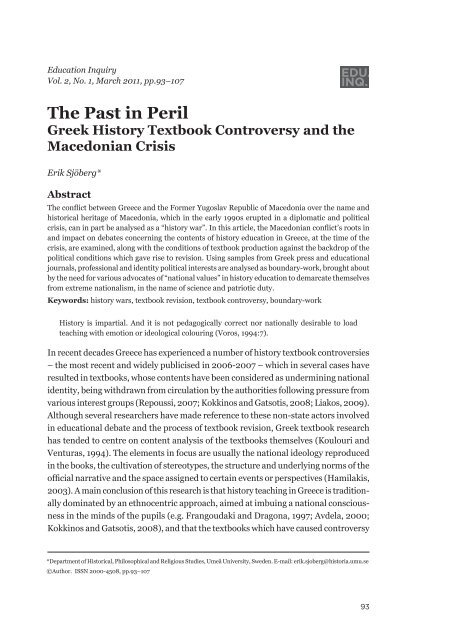Download issue - Umeå universitet
Download issue - Umeå universitet
Download issue - Umeå universitet
You also want an ePaper? Increase the reach of your titles
YUMPU automatically turns print PDFs into web optimized ePapers that Google loves.
Education Inquiry<br />
Vol. 2, No. 1, March 2011, pp.93–107<br />
EDU.<br />
INQ.<br />
The Past in Peril<br />
Greek History Textbook Controversy and the<br />
Macedonian Crisis<br />
Erik Sjöberg*<br />
Abstract<br />
The conflict between Greece and the Former Yugoslav Republic of Macedonia over the name and<br />
historical heritage of Macedonia, which in the early 1990s erupted in a diplomatic and political<br />
crisis, can in part be analysed as a “history war”. In this article, the Macedonian conflict’s roots in<br />
and impact on debates concerning the contents of history education in Greece, at the time of the<br />
crisis, are examined, along with the conditions of textbook production against the backdrop of the<br />
political conditions which gave rise to revision. Using samples from Greek press and educational<br />
journals, professional and identity political interests are analysed as boundary-work, brought about<br />
by the need for various advocates of “national values” in history education to demarcate themselves<br />
from extreme nationalism, in the name of science and patriotic duty.<br />
Keywords: history wars, textbook revision, textbook controversy, boundary-work<br />
History is impartial. And it is not pedagogically correct nor nationally desirable to load<br />
teaching with emotion or ideological colouring (Voros, 1994:7).<br />
In recent decades Greece has experienced a number of history textbook controversies<br />
– the most recent and widely publicised in 2006-2007 – which in several cases have<br />
resulted in textbooks, whose contents have been considered as undermining national<br />
identity, being withdrawn from circulation by the authorities following pressure from<br />
various interest groups (Repoussi, 2007; Kokkinos and Gatsotis, 2008; Liakos, 2009).<br />
Although several researchers have made reference to these non-state actors involved<br />
in educational debate and the process of textbook revision, Greek textbook research<br />
has tended to centre on content analysis of the textbooks themselves (Koulouri and<br />
Venturas, 1994). The elements in focus are usually the national ideology reproduced<br />
in the books, the cultivation of stereotypes, the structure and underlying norms of the<br />
official narrative and the space assigned to certain events or perspectives (Hamilakis,<br />
2003). A main conclusion of this research is that history teaching in Greece is traditionally<br />
dominated by an ethnocentric approach, aimed at imbuing a national consciousness<br />
in the minds of the pupils (e.g. Frangoudaki and Dragona, 1997; Avdela, 2000;<br />
Kokkinos and Gatsotis, 2008), and that the textbooks which have caused controversy<br />
*Department of Historical, Philosophical and Religious Studies, <strong>Umeå</strong> University, Sweden. E-mail: erik.sjoberg@historia.umu.se<br />
©Author. ISSN 2000-4508, pp.93–107<br />
93

















